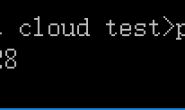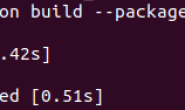学习在python中如何使用参数一定要看下面的代码
#!/usr/bin/env python # # [代码名字: Arguments] # [代码分类: Python Core] # [代码描述: GNU style arguments] # [代码作者: Jurjen Stellingwerff <jurjen@stwerff.xs4all.nl>] # [代码协议: GPL] # example arguments.py import sys program = "arguments.py" version = "0.1" def indent(size, text): """ Indents the lines of a text with 'size' spaces for every newline. """ i = 0 res = "" for line in text.split("\n"): if i > 0: res += "\n".ljust(size) + line else: res += line i += 1 return res def show_arguments(): out = [] size = 0 for argument in sorted(arguments): show = "" function, helptext, parameter = arguments[argument] if not helptext: continue if len(argument) > 1: show += " --" + argument else: show += "-" + argument others = False for other in sorted(arguments): function2, helptext2, parameter2 = arguments[other] if function2 == function and other != argument: others = True if len(other) > 1: show += ", --" + other if parameter2: show += "=" + parameter2 else: show += ", -" + other if parameter and len(argument) > 1: show += "=" + parameter elif parameter and not others: show += " " + parameter if len(show) > size and len(show) < 20: size = len(show) out.append((show, helptext)) for show, helptext in out: if len(show) <= size: print (" %-" + str(size) + "s %s") % (show, indent(size + 8, helptext)) else: print " " + show print (" %" + str(size) + "s") % "", indent(size + 8, helptext) def unknown_argument(argument): """ Show an informative error when encountering unknown arguments """ print program + ": unrecognized option '" + argument + "'" print "Try: `" + program + " --help' for more information" sys.exit(2) def parse_arguments(): """ Reads all the arguments from argv and interprets them in a GNU arguments style """ i = 0 paramfunction = None for argument in sys.argv: i += 1 if i == 1: continue if paramfunction: paramfunction(argument) paramfunction = None elif argument.startswith("--"): pos = argument.find("=") if pos > -1: try: function, helptext, parameter = arguments[argument[2:pos]] if not parameter: print "Argument '" + argument[2:pos] + "' cannot have a parameter" sys.exit() function(argument[pos + 1:]) except KeyError: unknown_argument(argument[:pos]) else: try: function, helptext, parameter = arguments[argument[2:]] function() except KeyError: unknown_argument(argument) elif argument.startswith("-"): for pos in range(1, len(argument)): try: function, helptext, parameter = arguments[argument[pos:pos + 1]] if parameter: paramfunction = function else: function() except KeyError: unknown_argument(argument[pos:pos + 1]) else: do_rest_arguments(argument) def add_argument(function, help_text=None, parameter=None): """ Add information about an argument: - function: function to call when this argument in given - help_text: the help text to show on the help page, omit this parameter on arguments with the same function - parameter: this argument needs a parameter """ return function, help_text, parameter # From here on the actual program code starts def do_help(): """ Prints a list of arguments for this program. Normally you would change this function to include more info like examples and another program descriptor. """ print "Usage: " + program + " [OPTION]... [REST]" print "Demonstrates python code for GNU style arguments." print "" print "Mandatory arguments to long options are mandatory for short options too." show_arguments() print "" print "Report arguments bugs to jurjen@stwerff.xs4all.nl" print "Python-snippets homepage: <https://code.launchpad.net/python-snippets>" exit() def do_version(): """ Show version information of this program """ print program + " " + version print "Copyright (C) 2010 Jurjen Stellingwerff" print "Lisense GPL: GNU GPL version 2 or later <http://gnu.org/licenses/gpl.html>." print "This is free software: you are free to change and redistribute it." print "There is NO WARRENTY, to the extent permittable by law." print "" print "Written by Jurjen Stellingwerff." exit() files = [] """ list of files to write to the standard output, can be filled by arguments """ verbose = True def do_quiet(): global verbose verbose = False def do_file(filename): global files files.append(filename) def do_something(argument): print argument def do_single(argument): print argument def do_rest_arguments(argument): print "Rest:", argument arguments = { 'version' : add_argument(do_version, 'output version information and exit'), 'h' : add_argument(do_help, 'display this help and exit'), '?' : add_argument(do_help), 'help' : add_argument(do_help), 'q' : add_argument(do_quiet, "don't print status messages to stdout"), 'quiet' : add_argument(do_quiet), 'f' : add_argument(do_file, 'display this file', parameter='FILE'), 'file' : add_argument(do_file, parameter='FILE'), 'this-is-a-bit-too-long-argument' : add_argument(do_something, "when arguments get too long the line splits\nand lines can contain newlines", parameter='SOMETHING'), 's' : add_argument(do_single, "single token argument with a parameter", parameter='SOMETHING') } parse_arguments() for filename in files: if verbose: print "Printing file", filename try: f = open(filename, 'r') for line in f.readlines(): print line.rstrip() except IOError: print "No such file: '" + filename + "'" # demonstrate the help page when there are no parameters given # not very useful in an actual program if len(sys.argv) == 1: do_help()




